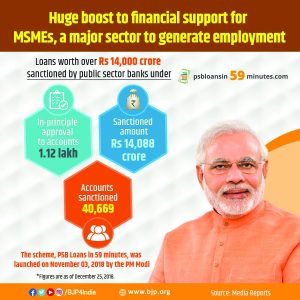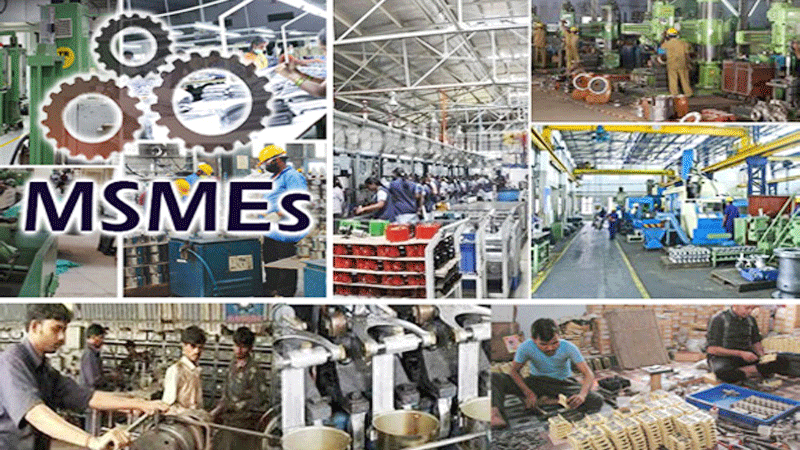Pratap Chandra Sarangi
Micro, Small and Medium Enterprises (MSMEs) form the backbone of the Indian economy. At comparatively lower capital cost than large industries, the MSMEs help in industrialization of rural and backward areas, thereby, reducing regional imbalances, assuring more equitable distribution of national income and wealth. MSMEs are primarily ancillary units, complementary to large industries. Given the overriding importance of this sector in the country’s economic development, the Ministry of Micro, Small & Medium Enterprises (MSME) was set up to promote growth and development of the MSME sector, including Khadi, Village and Coir Industries.
Growth and Performance
Over the years, MSME sector has emerged as a highly vibrant and dynamic sector of our economy contributing around 30 per cent to the Gross Domestic Product. The sector contributes significantly to employment, manufacturing output, and exports of the country. MSMEs employ an estimated 11.10 crore persons, next only to Agriculture.
It has been estimated that a lakh rupees of investment in fixed assets in the small scale sector generates employment for four persons. It is the only sector that provides maximum opportunities for both self-employment and wage-employment. In terms of value, the sector accounts for about 33 per cent of the manufacturing output and 48 per cent of total exports of the country. Export promotion from the MSE sector has been accorded a high priority. To help MSMEs in exporting their products, preferences were given to MSME exporters to participate in international exhibitions; training and exposures were given to the MSME exporters in areas of packaging, sector specific market inputs and other export- related requirements.
MSME sector contributes not only to higher rate of economic growth but also in building an inclusive and sustainable society in innumerable ways through creation of non-farm livelihood at low cost, balanced regional development, women empowerment and social balance, environmentally sustainable development and above all, sustaining economic growth amidst growing uncertainties in global economy.
The Government under the leadership of Hon’ble Prime Minister, Narendra Modi, recognized the inherent benefits of MSME sector and under several innovative policy interventions like Start-Up India, Stand-Up India and Make in India, the new MSMEs were set up and an entrepreneurial revolution was ushered in. Conscious efforts were made to put in place an MSME ecosystem to encourage new industries to gain foothold and existing ones to flourish. As a result, today we have more than six crore MSME Units. The most striking feature of this sector is its easy interface with women entrepreneurs. Today, of the total Units, 1.24 crore Units are owned by women entrepreneurs.
Challenges Faced By MSMEs
It has been felt that MSMEs have enormous potential to growth, keeping in view the industrial base that has been created and a consistently conducive policy focus on MSMEs. With the experience, it has been recognized that unless measures are taken to address multiple constraints being faced by MSMEs, perhaps the growth of this sector will stagnate and even decline. Therefore, to leverage the potential of MSMES, the 12th five-year plan focused on finance, technology, infrastructure and marketing support to MSMEs.
The Government remained always sensitive to the growth of MSMEs and, therefore, initiated actions to address the concerns of MSMEs in the areas of finance, technology, infrastructure and marketing. While the comprehensive measures were underway to create a conducive business ecosystem for the MSMEs and with enhanced budgetary allocations in 2020-21, the Ministry of MSME was all geared to impart the much needed impetus, the COVID 19, the global pandemic, hit the economy hard, creating a havoc in the MSMEs.
Impact Of COVID 19 On MSMEs
Covid-19 and the resultant lockdown has dealt a body blow to millions of small businesses in the country. Because of their size, scale of operation, limited finance and managerial resources, the MSMEs, in particular the MSEs, could not cope with difficulties brought on them by this pandemic. The lockdown in the country has affected the sector very badly in terms of shrinkage of exports, closure of production, non-availability of labour, uncertainty of consumption and liquidity squeeze in the market. This distressed sector has already rendered millions jobless and may lead to closure of a number of industries for good.
After due consideration of the difficulties faced by the MSMEs due to the impact of COVID 19, the Government has come out with an economic stimulation package to breathe life into the MSMEs and in the process revive the economy, which has witnessed unprecedented shocks across the sectors.
Economic Stimulus Package For MSMEs

The biggest challenge for MSMEs has been access to finance and this has been severely exacerbated in the current situation especially for meeting the working capital needs. MSMEs have taken the maximum hit and they need additional funding to meet operational liabilities built up, buying raw material and restarting business. The Government, therefore, announced a comprehensive stimulus package for the MSMES, which include:
• Rs 3 lakh crores Collateral-free Automatic Loans for Businesses, including MSMEs
• Rs 20,000 crores Subordinate Debt for Stressed MSMEs
• Rs 50,000 cr. Equity infusion for MSMEs through Fund of Funds
• New Turnover based definition of MSMEs
• Global Tender to be disallowed up to Rs. 200 crore
• e- market linkage for MSMEs to be promoted to act as a replacement for trade-fairs and exhibitions
• MSME receivables from Government and CPSEs to be released in 45 days.
These measures have the potential to help the MSMEs bounce back from the pandemic’s impact. The stimulus will help many Units resume operations and gradually sustain them in the business. The Subordinate Debt Fund and the Fund of Funds have the potential to address the long terms concerns of credit to the MSMEs. These are unprecedented decisions in the history of MSMEs to scale up their profile by integrating them to more dynamic and credible sources of finance.
Conclusion:
MSMEs in the Indian Economy have shown tremendous growth and excellent performance with the contribution of policy framework and efficient steps which had been taken by the Government from time to time for the growth and development of the MSMEs. In the post – COVID 19 situation, the Government has remained far more committed than ever before to provide much safer and better ecosystem for the MSMEs to grow and excel. The vision of the Hon’ble Prime Minister for shaping an ‘Atmanirbhar Bharat’ hinges greatly on the strong shoulders of our MSMEs.
(The writer is MoS for MSME and Fisheries, Animal Husbandry and Dairying, Government of India)


